
Story by Lana Sweeten-Shults
Photos by Elizabeth Tinajero
GCU News Bureau
It wasn’t exactly a new-car smell that put a glint in the eyes of junior and senior high school students at Grand Canyon University’s Health Sciences, Engineering and Technology Day.
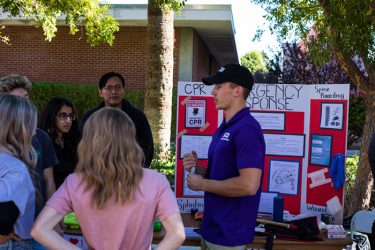
But it sure felt like a new-car smell as students on Thursday “oohed” and “ahhed” over the latest high-tech medical device in their midst — a vacuum splint.
Unlike old-school splints — padded boards fastened to a broken leg or another injured area with pieces of cloth — vacuum splints work by expelling out air to enable the thousands of polystyrene balls inside of it to mold around the injured body part and immobilize it.
“You don’t see these in high schools, or even in a lot of colleges,” said senior athletic training major Caleb Goodale. The technology is still relatively new, he said, and the devices a bit pricey.
Goodale, who manned the Sports Medicine Club’s emergency response table at the Athletic Training Showcase area, visited with hundreds of HSET attendees at what proved to be one of the popular areas of the event.
“They loved pressing on the CPR doll,” he said, and tested the high school students on their ability to handle high-pressure situations: “Are you counting?!?” he asked them, followed by a rapid-fire succession of other questions.
One student started to get flustered during the exercise. “But it was good. It was a lot of fun. The kids are very, very open to learn,” Goodale said.
More than 1,100 high school juniors and seniors and community college students registered to attend the annual HSET Day, presented by the Marketing Department’s ground event planning team.
Not only did they jump in to perform CPR on manikins or test out a vacuum splint, but they visited with a slew of other clubs on the Promenade, from the GCU Robotics Club to the University’s IEEE chapter (the Institute of Electrical and Electronics Engineers) and the chapter's race car-building Formula SAE Team.
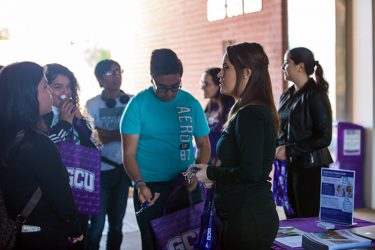
They also toured the DNA, nursing, engineering and cadaver labs; dropped into the Exercise Science Showcase; spoke with GCU students about their research; and dived into talks that ranged from “Glorious Frequencies: Music, Physics and Engineering” to “Lazy or Lupus? Is My Tiredness Pathological?” to “Google Hacking.”
An ever-popular area with visiting students on HSET Day was the cadaver lab.
“It was pretty crazy,” said Greenway High School senior Andy Ramirez after his tour of the lab. Ramirez attended HSET Day with his chapter of HOSA-Future Health Professionals.
Ramirez barely had time to get his bearings after the tour before Emily Ghena, a GCU program development specialist, met with the group to test what they learned in the lab.
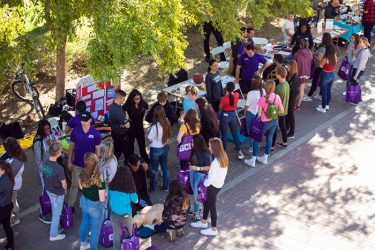
“Did they talk to you about the function of the liver?” she asked, and then the follow-up: “What is it called when your liver becomes diseased?”
“We’re dedicated to speaking with students interested in all sorts of medical professions,” Ghena said, and it’s easy to speak with them about GCU.
“The cadavers are really one of the big selling points. Medical schools have them, but for undergraduate students to get to experience them?”
That’s rare, Ghena said.
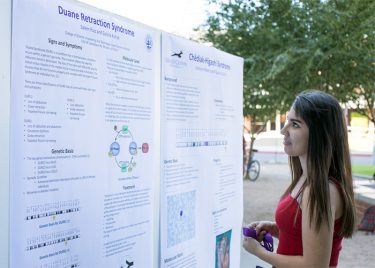
Pre-medicine major Salem Ruiz spoke to HSET attendees about something else that’s rare — a disease called Duane Retraction Syndrome, which affects the movement of the eyes.
Ruiz researched the disease in one of GCU biology Professor Dr. Galyna Kufryk’s genetics classes.
Ruiz said that when she was in high school, she didn’t get to attend anything quite like HSET Day, where students can learn about various career fields in the health sciences, engineering and technology.
“This one is way more hands-on. … You actually get to go into the labs,” she said, which is an opportunity not everyone has.
One of the popular lab tours of the day was the nursing tour.
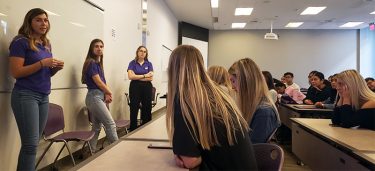
A group of about 75 students filled one of the rooms in the Natural Sciences Building to watch a video about the University’s simulation suites. It's where nurses get to practice medical skills on both manikins and live actors called standardized patients. They also gabbed with GCU Nursing students Leanne Lindahl, Andrea Broyles and Mariah Deguara.
Broyles told the high school students that she started out as a biology major and stuck with the program for two years before “I realized I did not have a passion for that,” she said.
So she switched to nursing and hasn’t looked back.
Lindahl shared how going from high school to college can be a hard switch. But the good thing about going to college is you can choose what you want to study rather than having to take so many required courses, such as in high school.
So, “Choose something you’re passionate about — something you’re excited about,” Lindahl said.
In their 10-minute Q&A, the nursing students answered questions about the rigor of nursing school and spoke about all the exams nursing students have to take, such as HESI (Health Education Systems Incorporated) exams. They also spoke about what helped them prepare for nursing school, such as taking anatomy and physiology classes in high school or joining organizations such as HOSA.
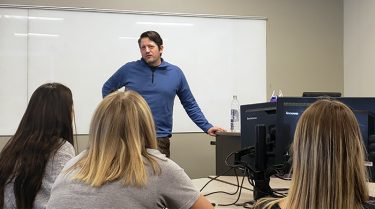
Dr. Aric Krogstad led a session titled “STEM Careers for Pet Lovers.” He shared the names of the veterinary schools in Arizona (Midwestern and the University of Arizona) and noted some trends in the field, such as it being a popular career choice for women — 75 percent of veterinary classes are taken by women. He also spoke about how the career field has moved from large-animal practice, when horses were a major mode of transportation, to small-animal practice.
He summarized the kinds of careers available in veterinary medicine, such as private practice, teaching, research and government jobs.
Another speaker, GCU alumnus Seth Thomas, conducted the session “Neurology and a New Era of Exercise and Sports Performance Training.”
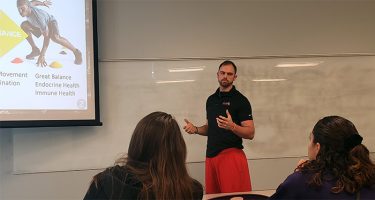
He said weight training once was king in sports performance training, then biomechanics.
“Now what you’re going to see in the next 10-20 years is going to be a lot more focus on the nervous system,” Thomas said.
He said the brain plays a major role in such things as measuring how much stress the body can take before creating an output, such as pain, when the stress becomes too much. Also, while the thought used to be that pain receptors signal the brain, “The brain is actually the thing that makes the choice of whether you’re in pain or not.”
Senior Jasleen Pena, who flew in with classmates from Coastal Academy in Oceanside, Calif., to attend HSET Day, stopped by to hear Thomas’ talk.
“I want to major in exercise science,” she said, and thought Thomas’ presentation was a no-brainer for her.
Back on the Promenade, Vaansh Sharma, a junior from Gilbert Classical Academy, attended HSET Day with his high school’s Future Doctors Club.
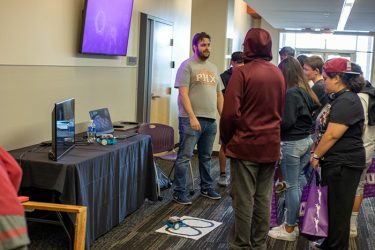
“What I like (about HSET Day) is that you can learn about your interests,” he said.
“And you get to explore different areas,” Gilbert Classical Academy junior Amy Cai added, so you can decide the next step in your life.
It was a thought that put a glint in her eye, new car smell or not.
Follow GCU senior writer Lana Sweeten-Shults at [email protected] or at 602-639-7901.
Related content:
GCU Today: Actors set the scene for nursing students
GCU Today: GCU's culture embraced at rebooted cyber center
GCU Today: Sprains, strains? Student athletic trainers step up
GCU Today: HSET Day shows nuts and bolts of robots, sciences



































































